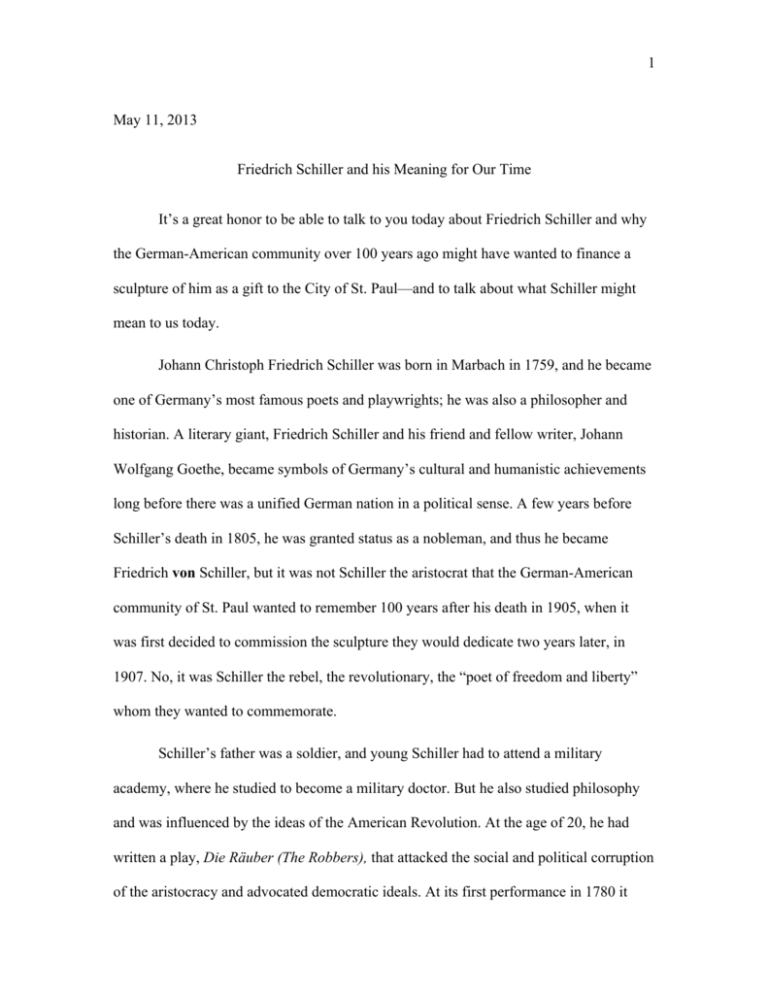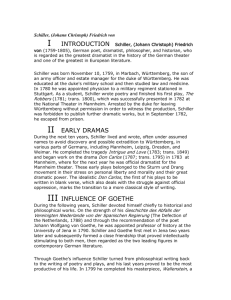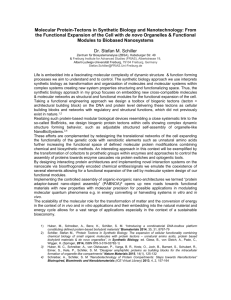Schiller talk 5-11-13
advertisement

1 May 11, 2013 Friedrich Schiller and his Meaning for Our Time It’s a great honor to be able to talk to you today about Friedrich Schiller and why the German-American community over 100 years ago might have wanted to finance a sculpture of him as a gift to the City of St. Paul—and to talk about what Schiller might mean to us today. Johann Christoph Friedrich Schiller was born in Marbach in 1759, and he became one of Germany’s most famous poets and playwrights; he was also a philosopher and historian. A literary giant, Friedrich Schiller and his friend and fellow writer, Johann Wolfgang Goethe, became symbols of Germany’s cultural and humanistic achievements long before there was a unified German nation in a political sense. A few years before Schiller’s death in 1805, he was granted status as a nobleman, and thus he became Friedrich von Schiller, but it was not Schiller the aristocrat that the German-American community of St. Paul wanted to remember 100 years after his death in 1905, when it was first decided to commission the sculpture they would dedicate two years later, in 1907. No, it was Schiller the rebel, the revolutionary, the “poet of freedom and liberty” whom they wanted to commemorate. Schiller’s father was a soldier, and young Schiller had to attend a military academy, where he studied to become a military doctor. But he also studied philosophy and was influenced by the ideas of the American Revolution. At the age of 20, he had written a play, Die Räuber (The Robbers), that attacked the social and political corruption of the aristocracy and advocated democratic ideals. At its first performance in 1780 it 2 caused a sensation, becoming wildly popular with the younger generation. The play also caused Schiller to be censored, forbidden from writing literature anymore by the Duke of Württemberg. Instead of accepting this fate, Schiller abandoned his regiment and fled the Duke’s realm to make his living as a poet and scholar in another small German state. The Schiller of the early 1780s belonged to the literary movement called Sturm und Drang, “storm and stress,” a movement begun in the 1770s by rebellious young writers, including the young Goethe. It was Schiller the young rebel who wrote the poem An die Freude, the “Ode to Joy,” in 1785, proclaiming a new world in which “Alle Menschen werden Brüder,” all men will become brothers, that all people will recognize their membership in a common humanity, as one family. 1 It is this Schiller who influenced the French Revolution and who was made an honorary citizen of the French Republic in 1792. This is also why Beethoven would later use this poem for the finale of his monumental 9th symphony, at the end of that famous composer’s life. Schiller, however, soon became dismayed by the excesses of the French Revolution in the 1790s as it descended into the reign of terror symbolized by the guillotine. Along with Goethe, who became his friend in that same decade, he moved 1 This ideal is worded in a less sexist manner in German, because Menschen means “human beings,” not “men,” but of course in German as well as English, the call is for a universal “brotherhood.” As I was reminded by Professor Ruth-Ellen Joeres, my colleague here in the Department of German, Scandinavian & Dutch at the University of Minnesota, Schiller’s progressive ideas did not really include women—and this is why I am glad the Schiller poem Die Glocke, “The Bell,” was not recited today, with its insistence on separate spheres for men and women, with the latter relegated to the domestic sphere. As with Schiller, the ideal of equality espoused by the “Founding Fathers” of the American Republic were limited by prejudices about gender (and race and class) that we reject today. Fortunately the ideal of equality embraced by these men of the 18th-century has proved to be much stronger than such prejudices. 3 towards a more classical approach to literature. Disillusioned by contemporary politics— by the degeneration of French democracy2 and the small, absolutist monarchies of Germany—he wrote about important political figures from the past in such famous plays as Mary Stuart, The Maiden of Orleans (about Joan of Arc), & William Tell. It is this classical Schiller we find in the 1797 poem Der Handschuh (The Glove), the poem that the young students from the Twin Cities German Immersion School will soon recite for you. But in that poem you can still note Schiller’s rejection of the aristocratic codes of chivalry dating back to the Middle Ages. In the early 19th century, Schiller and Goethe were important icons not just of German humanism but of European humanism; indeed, they represented an international humanism. By the late 19th century, as Germany was unified politically by Prussian military power, the two literary heroes became increasingly perceived as heroes in the pantheon of German nationalism, without much understanding for the deeper meaning of their literary and philosophical works. But I would still argue that the German-American community of St. Paul wanted to honor Schiller in the early 20th century as the poet of freedom and liberty, not as a symbol of German nationalism. In fact, this is clear even in the remarks made in 1907 for the dedication of the Schiller statue by Dr. Theodore Barth, a former member of the German parliament who gave his speech in German and brought greetings from the Kaiser, the monarch of a non-democratic German empire. Dr. Barth stated that the 2 As the Honorary Consul reminded us, the French Republic ended up with a military dictator—Napoleon—who crowned himself Emperor and led his armies on a war of conquest through Europe (which in the conquered German lands inspired the first dreams of a politically united German nation). 4 freedom of which Schiller had dreamed had been realized in America.3 And America, as we know, was a democratic republic (albeit one that still denied women the right to vote and treated African-Americans as second-class citizens). By 1918, the German Empire lost World War I, the Kaiser fled, and the first German democracy was established. But by 1933 an extreme, anti-democratic form of German nationalism would triumph, and that regime, the Nazi regime, would try to turn Schiller into a precursor of their racist and anti-Semitic ideology. But this was clearly a perversion of Schiller, and the Nazis in fact needed to censor some of his plays. Many years later, the Berlin Wall was “opened” on November 9, 1989, and the citizens of East Germany began to enjoy new freedoms.4 Soon the Jewish-American 3 “Honor Great German Poet: More than 5,000 People Attend Unveiling of the Schiller Monument at Como Park.” Daily Pioneer Press, St. Paul, MN, Monday, July 8, 1907. Thanks to Nic Hager for forwarding this to me, and to the research of Colin NelsonDusek, which led to his excellent essay, “A Monument to Freedom, a Monument to All: The Restorarion of the Johann Christoph Friedrich von Schiller Memorial in Como Park,” written to accompany the restoration of the statue. 4 In my hurried attempt to summarize over two centuries of German history, I should have said a bit more about both post-WWII German states founded in the aftermath of the defeat of Nazism. Both of them made a claim to the democratic tradition; the East German state even called itself the Deutsche Demokratische Republik, the “German Democratic Republic,” but it became clear very soon that its concept of “democracy” did not entail free elections or freedom of speech, and in fact it became a police state. It made attempts to claim Schiller as a pioneer of the class struggle, but it was just as interested in suppressing the demand for Gedankenfreiheit, “freedom of thought” found in Schiller’s play Don Carlos, as the Nazis had been. The West German state, the Bundesrepublik Deutschland, the “Federal Republic of Germany,” was much more aligned with the ideals of freedom and democracy Schiller had admired in the American Revolution, although many of us would argue that it took the student protests of the 1960s to achieve these ideals more completely (and also to confront more honestly the legacy of the Nazi era— much as American democracy needed the Civil Rights Movement of the 1960s to begin to redress the legacy of slavery and “Jim Crow”). 5 composer and conductor Leonard Bernstein5 came to East Berlin to direct an orchestra of East and West German musicians in a performance of Beethoven’s 9th symphony on Christmas Day, 1989. And in the finale, the 4th movement of that symphony, when the chorus sings the words to Schiller’s An die Freude (the Ode to Joy), Bernstein changed all the references to Freude into another German word beginning with FR: Freiheit. An die Freude became An die Freiheit, that is, the “Ode to Joy” became the “Ode to Freedom.”6 And this was no perversion of Schiller’s meaning, as the final stanza of the poem makes clear. I will recite that stanza for you. It does not appear in the program, which only contains the beginning of the poem, which is what the Minnesota Chorale will so generously perform for us this morning. (By the way, I need to thank my colleague, Bill Beeman, Professor and Chair of Anthropology at the University of Minnesota, for his help facilitating the contact to the Minnesota Chorale.) Here is that final stanza: Deliverance from the chains of tyranny Generosity even to the criminal Hope to those on their deathbeds 5 I should also have mentioned that Bernstein was a gay American, speaking as I was only two days after the triumph for equality in Minnesota represented by the passage of the Marriage Equality Bill in the Minnesota House of Representatives. 6 In fact there are those who maintain that Schiller himself had originally intended to call the poem An die Freiheit, “Ode to Freedom,” but had changed it to fool the censors. See for example Klaus Geitel, “Exulting Freedom in Music,” The Leonard Bernstein Office, Inc., 2008-09, http://leonardbernstein.com/hc_berlin.htm. 6 Mercy at the Last Judgment! Even the dead shall live! Brothers, drink and chime in All sinners shall be forgiven, And hell shall be no more.7 This is the meaning Schiller has for us today, a message of joy that is a vision of freedom and human rights, a vision of tolerance, forgiveness, and redemption, a vision of a world in which all women and men will become equal members of one human family, with the same rights to freedom and happiness. Thank you! Rick McCormick Professor and Chair Department of German, Scandinavian & Dutch University of Minnesota 7 My translation, but in consultation with various other translations. I also want to thank two scholars with whom I have consulted, my colleague Professor Matthias Rothe from my own department here at the University of Minnesota, and also Professor Jeffrey High, Professor of German Studies at California State University, Long Beach.








